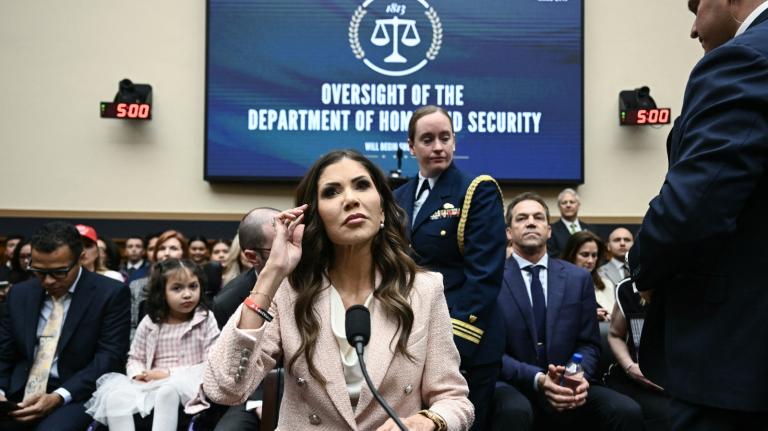 Does good governance require a certain amount of this? Last week, I suggested that Obama “purge his administration of oil hacks.” I identified three: William Reilly, co-chair of the administration’s oil-spill investigation commission and a well-compensated director of ConocoPhillips since 1998; Steve Koonin, who took the a top Department of Energy post in 2009 after serving as BP’s chief scientist since 2004; and Sylvia Baca, who set up shop as deputy administrator for land and minerals management at the Minerals Management Service in 2009 after serving as a BP exec since 2001.
Does good governance require a certain amount of this? Last week, I suggested that Obama “purge his administration of oil hacks.” I identified three: William Reilly, co-chair of the administration’s oil-spill investigation commission and a well-compensated director of ConocoPhillips since 1998; Steve Koonin, who took the a top Department of Energy post in 2009 after serving as BP’s chief scientist since 2004; and Sylvia Baca, who set up shop as deputy administrator for land and minerals management at the Minerals Management Service in 2009 after serving as a BP exec since 2001.
I considered my proposal to be eminently modest, given what’s going on in the Gulf. But Michael Levi, senior fellow for energy and environment at the Council on Foreign Relations, disagrees. In a Monday blog post entitled “Obama needs more oilmen,” Levi takes me and other critics to task. He writes:
I can understand their concerns. The reality, though, is that the Obama administration is dangerously short of senior people who actually understand how the oil industry works. Even if the United States were to (wisely) adopt an ambitious policy that dramatically lowered U.S. dependence on oil, we’d still be consuming a lot of oil for quite a while. Given that reality, it would seem wise to have some people around who understand the guts of how the oil world works.
Levi even points approvingly to a fourth Big Oil insider now in the administration. Glen Sweetnam, until recently vice president & principal at Houston-based Lukens Energy Group, has taken the post of senior director for energy at the National Security Council. In addition to his time at Lukens, Sweetnam has served stints at energy/chemical giants Koch and ARCO, among others.
The new NSA post doesn’t mark Sweetnam’s first trip through the revolving door between industry and government. According to his bio, “Mr. Sweetnam was also the Director of Economic Analysis in the U. S. Department of Energy, where he played a significant role in the deregulation of the natural gas industry in the 1980s.” (Emphasis added.)
Well, no one should doubt that industry execs, when they dabble in government, make excellent deregulators. But do they make good regulators?
Levi’s argument can be restated like this: We need to have foxes among those guarding the henhouse, because only a fox understands what the foxes are up to. I can see where he’s coming from. We can’t wish the petroleum industry away. Even if Bill McKibben or Vandana Shiva began to rule the world tomorrow, we’d still have to use petroleum for years, as we worked diligently to conserve energy and transition to renewable sources of it.
But I challenge the notion that you have to have a direct stake in the oil industry to understand how it works. Indeed, the insider’s perspective can be quite blinkering — witness BP’s utterly failed attempt to go “beyond petroleum.” From inside a company that mints a fortune every day by extracting, processing, and vending a single product, it must be awfully tempting to place that product at the center of any vision of the future. And that’s what oil execs in high policy positions can be expected to do.
Meanwhile, diligent outsiders can and do gain deep and valuable insights into how an industry operates. Did Eric Schlosser need to do time as a McDonald’s exec before he could write Fast Food Nation? I’m not suggesting that journalists be tapped to run federal agencies: that would be a disaster! I’m just saying that you don’t need to be a member of a group to become an expert in that group’s activities. Levi himself is employed as an energy-industry expert by a prestigious institution, yet his bio lists no industry experience.
And at any rate, how much help does the oil industry need in communicating its agenda to government officials? Do they really need former execs skulking the halls of government to get their point across? We may live in a digital world, but exploiting fossil fuel resources remains the globe’s most profitable activity. When Fortune ranked the world’s top companies by profit in 2009, oil and natural gas firms took the first six slots. (BP clocked in at No. 5.) Combined, those six firms brought home $165 billion in profit.
That kind of loot buys plenty of lobbying power. In 2008 alone, the oil and gas industry spent a cool $134.6 million lobbying the U.S. government. Indeed, with or without former execs in high posts within the Department of Energy and the Minerals Management Service, BP would likely have no trouble getting the ear of the Obama administration. According to the Center for Responsive Politics:
During the 2008 election cycle, individuals and political action committees associated with BP — a Center for Responsive Politics’ “heavy hitter” — contributed half a million dollars to federal candidates. About 40 percent of these donations went to Democrats. The top recipient of BP-related donations during the 2008 cycle was President Barack Obama himself, who collected $71,000. BP regularly lobbies on Capitol Hill, as well. In 2009, the company spent a massive $16 million to influence legislation. During the first quarter of 2010, it spent $3.53 million on federal lobbying efforts, ranking it second (behind ConocoPhillips) among all oil and gas industry interests.
If phasing out fossil fuels really is the goal, I still don’t see where oil hacks fit into the administration. There are no shortage of foxes who volunteer to guard the henhouse — some of them, no doubt, earnestly intending to use their foxian wiles for the public good. But when we hand them the job, as we so routinely do, can we really be surprised when they devour a few hens?
After all, to paraphrase the words of another predatory species: it’s their nature.




